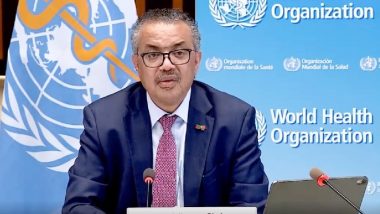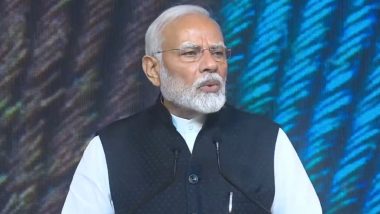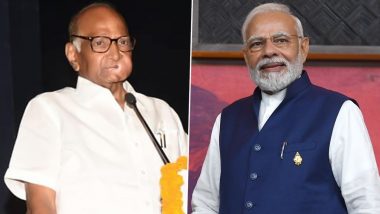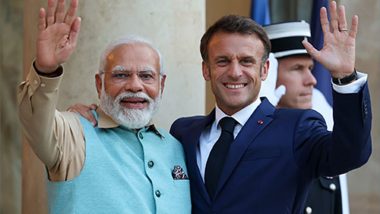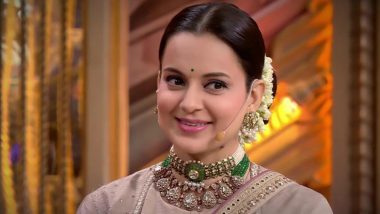Gandhinagar, August 16: Countries of all income groups should invest in primary health care (PHC), which can provide more than 80 per cent of services and also help detect outbreaks of pandemics at an early stage, WHO's Director-General Tedros Adhanom Ghebreyesus said on Wednesday. On the EG.5 strain of the SARS-CoV-2 virus being recently classified by the World Health Organisation (WHO) as a “variant of interest”, Ghebreyesus said it is important to “continue to remain vigilant”.
Ghebreyesus was talking to media persons during his visit to a health and wellness centre (HWC) at Adraj Moti village in Gandhinagar district after his arrival here to attend a global summit on traditional medicine. “The investment in primary health care in ‘Ayushman Bharat' by the Government of India is the right investment, and that's what we are asking all countries to really focus on. As you know, many countries including high-income countries were surprised by COVID-19,” he said. PM Narendra Modi Greets WHO Chief Tedros Adhanom Ghebreyesus Ahead of Global Summit on Traditional Medicine in Gujarat (Watch Video).
The problem was because of a lack of investment in primary health care, Ghebreyesus said. He said the WHO supported India's Ayushman Bharat initiative ever since it was announced because it believes that countries should invest in primary health care. This is something that the WHO has been telling countries “and India is actually doing that”, he told reporters. Ayushman Bharat, a flagship scheme of the Centre, aims at achieving the vision of Universal Health Coverage. In any health system, Ghebreyesus said, “a strong primary health care is key because most of the services can be provided at primary healthcare level – more than 80 per cent”. Pakistan: Mob Attacks Church in Faisalabad Over Blasphemy Allegations; Visuals Surface.
WHO Chief India Visit
#WATCH | WHO (World Health Organisation) DG, Tedros Adhanom Ghebreyesus says "I like the name Tulsi Bhai because the 'Tulsi'is a medicinal plant. I just planted Tulsi here in the Wellness Centre. I'm really happy to do that because it has many benefits. WHO has always supported… pic.twitter.com/C1dFtIBHd0
— ANI (@ANI) August 16, 2023
Not only that “outbreaks can be prevented at primary health care and can be detected earlier at primary health care level”, he said. Investment in primary health care “is the right investment” for all countries, whether they are in high, middle or low-income groups, he said. Sharing his experience of visiting the HWC, Ghebreyesus said he was glad to witness first-hand how it functions, including the telemedicine service provided by a doctor to a patient remotely, sitting 40 kilometres from here. “And I'm really happy that not only services provided here, but the patients, instead of travelling to far places and spending on transport fees and so on, can get additional services remotely and that's what we have witnessed one person getting the benefit of the telemedicine,” he said.
The WHO chief said he was glad to witness first-hand how the Ayushman Bharat functions and hoped the Indian government will continue to invest in it. In February 2018, the Centre announced the creation of 1,50,000 HWCs by transforming existing sub-centres and primary health centres as the base pillar of Ayushman Bharat. Speaking on the EG.5 strain of the SARS-CoV-2 virus circulating in different parts of the world, including India, as being classified by the WHO as a “variant of interest”, Ghebreyesus said that it is important to continue to remain vigilant.
“So on new variants, not only EG.5, we would expect more variants. What's important is to really, you know, continue to be vigilant. Many countries are not testing enough, and we wouldn't know whether the virus is changing or not,” he said. “So from the EG.5, what we can say is that new variants may emerge and continue so tests will be very important and see how the virus is behaving. But we have been following the variant, and all emerging variants, and we continue to be vigilant,” he said. On being called “Tulsi Bhai” by Prime Minister Narendra Modi, Ghebreyesus said that he liked the name because tulsi is a medicinal plant.
Earlier, reacting to a video of Ghebreyesus joining a 'dandia' event, PM Modi said, "My good friend Tulsi Bhai is clearly well prepared for Navratri! Welcome to India, @DrTedros." "By the way, I just planted tulsi here in the wellness center. And I'm really happy to do that because it has many benefits too. I don't see it only as medicinal, but I think given the climate change we are witnessing now, planting trees is very important,” Ghebreyesus said. “So I'm really glad to be part of that. So I'm happy to be called Tulsi Bhai given the prominence of the plant itself,” he said.
(This is an unedited and auto-generated story from Syndicated News feed, LatestLY Staff may not have modified or edited the content body)







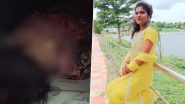





 Quickly
Quickly








